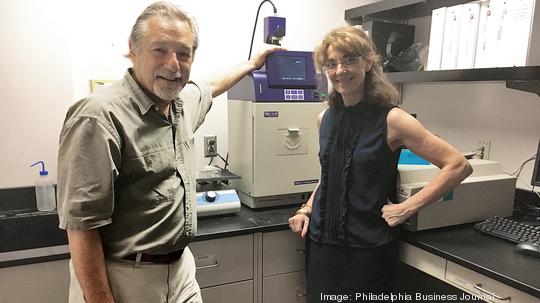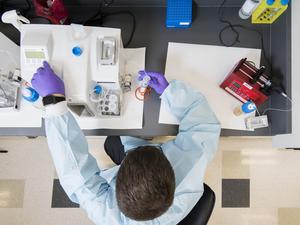
This week's Lab Notes has items on a Philadelphia biotechnology firm's multimillion-dollar stock sale, a Philadelphia gene-editing company's approval for a study in Australia, a progress update on a Buck County firm's experimental treatment for cardiogenic shock and more.
Here's the roundup:
Enterin
The Philadelphia biotechnology company focused on developing a new way to treat Parkinson's and other neurodegenerative diseases has raised $5.1 million in its latest private stock sale.
Enterin's Series D equity financing was disclosed in a document the company filed with the Securities and Exchange Commission. The company declined to comment on who the investors are or its planned use for the proceeds.
Enterin previously raised about $50 million in three rounds of equity financing, including a $14 million Series C in 2020 led by Indie Assets and New Venture Partnerships. The firm also raised $11 million in two debt financings completed in 2021 and 2022.

Enterin was founded 2014 by Dr. Denise Barbut, Dr. Michael Zasloff and William Kinney with a goal of being the first company to develop a drug that repairs the dysfunctional gut-brain axis in patients with Parkinson's and other neurodegenerative diseases. David McCullough, a former Merck executive, is the company's CEO.
iEcure
The Australian Therapeutic Goods Administration has approved the Philadelphia gene-editing company's application to conduct human testing of its lead new drug candidate.
The product, ECUR-506, is iEcure's experimental therapy in development for the treatment of ornithine transcarbamylase deficiency, a serious liver disease, in pediatric patients.
A spokesperson for iEcure said the company is in the process of seeking several approvals to begin clinical trials for the study across the world and anticipates additional countries’ regulatory bodies to provide clearance to begin phase 1/2 clinical trials in the first half of 2024.
"[Ornithine transcarbamylase deficiency] is a rare condition with a small, but in need, patient population," the spokesperson said. "We are working to set up clinical trial sites around the world to meet patients and their families where they are. The acceptance of the clinical study by regulatory authorities in Australia is a significant step towards this goal."
Windtree Therapeutics
The Bucks County biotechnology company enrolled the first subject in its phase 2 clinical trial testing its new drug candidate istaroxime as a treatment of early cardiogenic shock.
Cardiogenic shock is a rare and potentially life-threatening condition, most often caused by a severe heart attack, in which the heart suddenly can't pump enough blood to meet the body's needs.
Windtree (NASDAQ: WINT) of Warrington said results from the study, which is expected to enroll up to 30 patients, are expected in mid-2024.

Craig Fraser, the company's president and CEO, said Windtree has already generated positive data from three previous phase 2 studies of istaroxime in patients with acute heart failure and early cardiogenic shock. The latest study, he said, is expected to contribute to finalizing Windtree's strategy and design for its phase 3 clinical trials — typically the last hurdle a company must clear successfully before seeking approval for an experimental therapy.
Quick Hits
The Food and Drug Administration granted regenerative medicine advanced therapy designation to Malvern-based Ocugen (NASDAQ: OCGN) for OCU400, the biotechnology company's experimental treatment of retinitis pigmentosa with RHO gene mutations. Retinitis pigmentosa is an inherited, degenerative eye disease that leads to severe vision impairment. The designation, part of the 21st Century Cues Act, is intended to help expedite development of new regenerative medicines to treat, modify, reverse, or cure a serious condition. Ocugen is working with the FDA to finalize the Phase 3 clinical trial for OCU400, the results of which will be used to support an application for marketing authorization. … Philadelphia gene therapy developer Passage Bio (NASDAQ: PSAG) announced promising initial data from its ongoing global phase 1/2 clinical trial evaluating its lead investigational gene therapy PBFT02 for the treatment of frontotemporal dementia. Frontotemporal dementia is a form of early onset dementia. It has no approved disease-modifying therapies.







